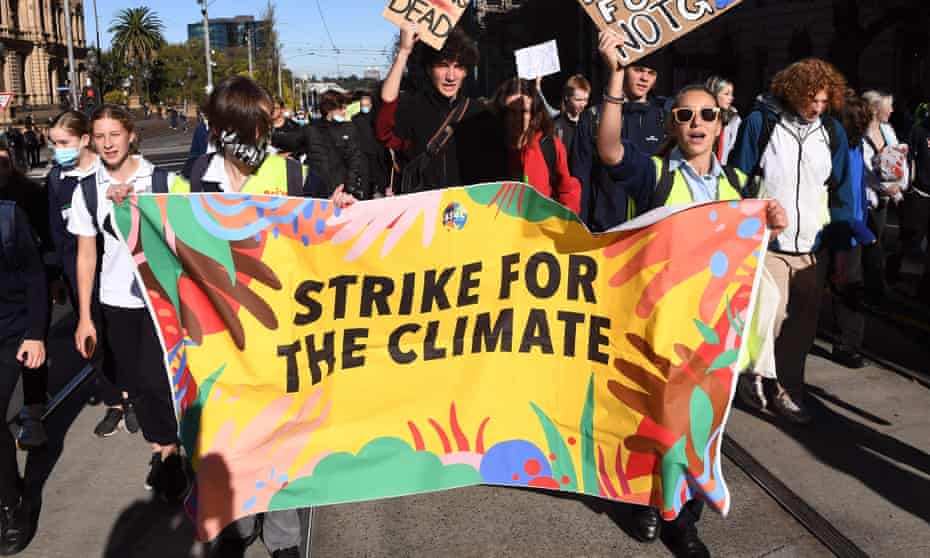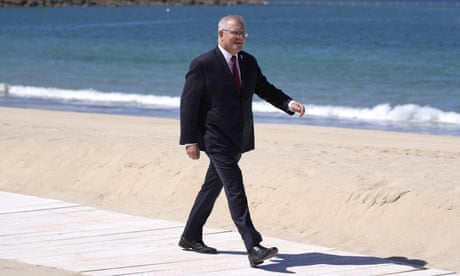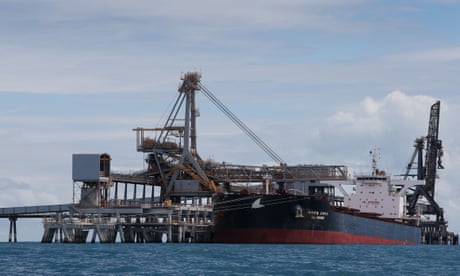Extract from The Guardian
Five young people argue 2030 emissions target fails to uphold the rights of young Australians.

A Melbourne School Strike 4 Climate rally in May. Ethan Lyons, one of the five people lodging complaints with the UN says he heard about the plan through the campaign.
Last modified on Mon 25 Oct 2021 03.31 AEDT
Five young Australians, including members of First Nations and disability communities, have lodged three human rights complaints with the United Nations over what they claim is the Morrison government’s inaction on climate.
The complainants – aged between 14 and 24 years old – argue that the Australian government’s 2030 emissions reduction target fails to uphold the rights of every young person in Australia.
They claim the target is putting young First Nations people and people with disabilities at risk of acute harm from climate change.
They filed the complaint just days before the Cop26 climate conference in Glasgow, where key allies, like the US and UK, will expect to see improvements to Australia’s emissions reduction targets.

Among the complainants is Ethan Lyons, a 15-year-old Wiradjuri teenager, who first heard about the opportunity through the School Strike 4 Climate campaign.
“As a Wiradjuri teen, it is so vital that representation of First Nations mob is seen in the broader climate movement, and as the complaint is being presented on such a large level. I was motivated to bring my concerns surrounding climate change and its effects on culture,” he told Guardian Australia.
“Additionally, as a young person, also living with a disability, I feel it is necessary to do as much as I can to demand a safe future for all young people … we have seen things like worsened bushfire seasons, destructions of sacred land for coal, bigger heatwaves, and it is time to start taking action on the people that will not do anything about it.”
Australia currently has a 2030 target to reduce greenhouse gas emissions by 26-28% of 2005 levels. The target has been widely criticised as inconsistent with scientific advice and inadequate to slow global warming.
The
group, represented by lawyers from Environmental Justice Australia,
have filed complaints with the UN special rapporteurs for human rights
and the environment, the rights of Indigenous people, and the rights of
persons with disabilities.
Senior climate specialist lawyer at Environmental Justice Australia, Hollie Kerwin, says this is significant because special rapporteurs have the power to investigate a breach of human rights, and report these breaches to the Australian representative to the United Nations, and the UN Human Rights Council.
The group is calling on the special rapporteurs to urge the Australian government to increase its 2030 emissions reduction targets. They have also asked for an explanation from the Australian government as to how its alleged current inaction on climate change is consistent with his human rights obligations to young people.
But, Kerwin adds, “the act of appealing to the special rapporteurs is significant itself because it shows that these young people know how serious the stakes are and are stepping up and bravely saying ‘this is happening to us’. It’s not a thing in the future, it is happening now.”
“It also allows them to call out on the world stage and domestically what they think of Australia’s dangerously low 2030 target,” she says.
Lyons says that First Nations communities risk losing connection to country and culture as a result of climate change.
“The overarching issue of the climate crisis and how it impacts First Nations communities is the greater loss of cultural understanding and engagement to the land,” he says.
“Not only does the climate crisis uniquely impact our culture but it also directly impacts our health – vulnerable elders, natural medicines and healing practices are all at risk because of climate change.”
“On the topic of tradition, there is a mob whose culture depends on waterways and because of droughts, those profound and deep links to heritage are diminished; you also have to consider those communities who are living rurally without proper housing.”
Another member of the group, 18-year-old Leila Mangos, says that young people are the ones will pay the price for what she says is the government’s climate inaction.

“By 2030, I will only be 26. My life will have barely begun. We’re told time and time again that we will save the planet, and those who should be responsible for climate action – our world leaders – pass the responsibility down to us, the generation who can do nothing about it,” she says.
“I have struggled with depression and anxiety brought on by the knowledge that without action by our governments, the planet I live on has an expiry date.”
No comments:
Post a Comment